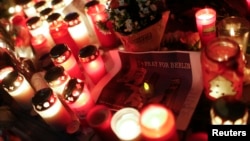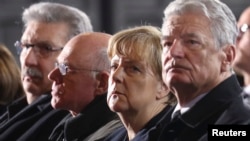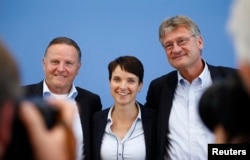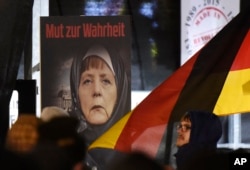Among the casualties of Monday's truck attack in Berlin could be the political career of German Chancellor Angela Merkel. Opponents, and some of her supporters, quickly blamed her controversial migrant policy for the incident.
German police said the attack, which killed 12 people and injured many others at a crowded Christmas market, was deliberate, but as of Tuesday night they had yet to apprehend a suspect. A man detained earlier and described as a Pakistani asylum-seeker was released Tuesday after police determined he was not the suspect they wanted.
"I know it would be especially hard for us all to bear if it were confirmed that the person who committed this act was someone who sought protection and asylum in Germany," Merkel said Tuesday.
"This would be especially despicable for the many, many Germans who day in, day out, are active working for refugees, as well as for those people who actually need our protection and who make an effort to integrate into our country," the German leader said, underscoring the dilemma that has deeply polarized her country since the start of the migrant crisis.
Fourth term for Merkel?
Merkel recently announced she plans to seek a fourth term when Germany holds national elections next year.
On Tuesday, those prospects appeared to be in question.
Merkel’s opponents and anti-Islam advocates swiftly blamed the German leader and what some describe as her open-door policy toward migrants entering the European Union In Germany alone, 890,000 people, most of them Muslims, applied for asylum last year.
“Terror in Berlin is not an isolated case and is directly related to Merkel’s asylum policy,” the Alternative for Germany, a new far-right party whose popularity has risen sharply since the start of the migrant crisis, tweeted Tuesday.
“Merkel will have great problems, I think, to win the election in September in Germany,” said Michael Sturzenberger, a controversial anti-immigration advocate in Munich who opposes immigration by Muslims to Germany.
“She is getting more and more problems because her policy is responsible for the terror and we will have more terror in Germany and in Europe and she does not want to change her policy,” he said.
The criticism from her known opponents was not a surprise to anyone, but the warnings from her supporters on Tuesday were largely unexpected.
“We owe it to the victims, to those affected and to the whole population to rethink our immigration and security policy and to change it,” said Horst Seehofer, the leader of Bavaria's Christian Social Union, which is allied with Merkel's Christian Democrat Union, or CDU.
Taking a harder stance
Merkel has sought to temper criticism of her policy on migrants and taken measures recently to show she is against what many Germans consider to be the illiberal aspects of Islam, especially those regarding women.
Merkel received loud applause from delegates at the CDU's annual conference earlier this month when she called for a ban on the burqa in schools and other public buildings.
“The full veil must be banned, wherever legally possible. Showing your face is part of our way of life,” Merkel said. “Our laws take precedence over honor codes, tribal customs and sharia."
Last week, her defense minister, Ursula von der Leyen, sparked anger in the Muslim world but praise at home by refusing to wear a veil while meeting with officials in Saudi Arabia.
Merkel’s critics on the far-right call these empty gestures. “These are little, little steps. She wants to tell the people, ‘Yes, I’m doing something,’ but she’s not doing enough,” said Sturzenberger. “She is not able to protect our country from this real danger.”
Germany, like other parts of western Europe, was hit by a series of attacks in 2016.
In July, an asylum-seeker from Afghanistan wounded five people on a train with an axe before he was shot dead. The Islamic State group claimed responsibility.
Later that month, a German citizen of Iranian heritage shot and killed nine people in Munich before killing himself.
Also in July, a Syrian man who had claimed asylum in Germany blew himself up outside a music festival in Ansbach and injured 15 people.
A year ago, Germans were outraged when men who included refugees sexually assaulted hundreds of women during New Year’s celebrations in Cologne.







